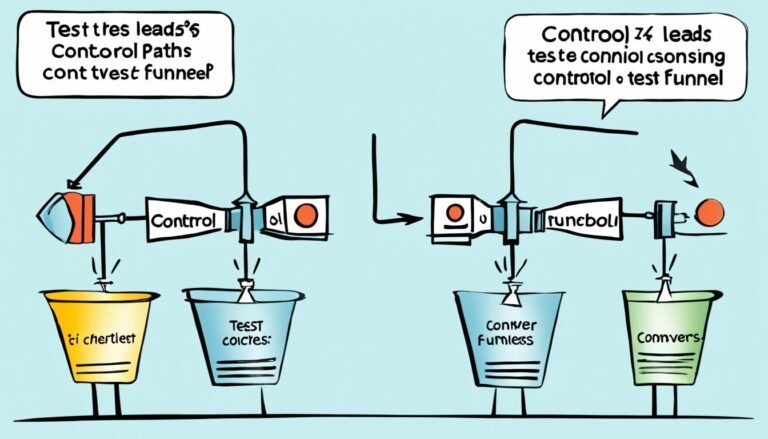Unlocking High-Pressure Sales Techniques Psychology
Sales is not just about offering a product or service. It involves understanding human psychology and using that knowledge to build relationships, establish trust, and guide buyers towards making a purchase. The art and science of sales psychology delve into understanding how consumers think, feel, and make decisions, allowing salespeople to employ persuasive selling strategies and psychological sales tactics to influence potential customers effectively.
In this article, we will explore various aspects of sales psychology, from the principles of influence and the psychology of persuasion to ethical sales techniques and persuasive communication. By understanding consumer psychology in sales, salespeople can unlock the secrets of successful selling and develop strategies that resonate with their target audience.
Are you ready to enhance your sales techniques and tap into the power of sales psychology? Let’s dive in.
Key Takeaways:
- Understanding consumer psychology is essential for effective sales techniques.
- Persuasive selling strategies and psychological sales tactics can influence potential customers.
- Ethical sales techniques prioritize building relationships and providing value.
- By leveraging the principles of influence and the psychology of persuasion, salespeople can enhance their sales effectiveness.
- Persuasive communication tailored to consumer psychology can drive successful sales outcomes.
Understanding Your Prospects
Every prospect is unique, with distinct needs, desires, and motivations. To build strong connections and drive sales, it is essential for salespeople to understand their prospects on a deeper level. By gaining a deep understanding of each client’s personality, pain points, and preferences, salespeople can tailor their sales pitches to effectively address their prospects’ specific needs.
Building relationships with prospects requires empathy, active listening, and an ability to read body language and non-verbal cues. Empathy in sales allows salespeople to connect with prospects emotionally, showing that they understand and care about their concerns. Active listening helps uncover valuable information that can be used to personalize sales approaches, while body language and non-verbal cues provide insights into prospects’ thoughts and feelings.
Empathy in Sales
Empathy is the ability to understand and share the feelings of another person. In sales, empathy plays a crucial role in establishing rapport and building trust with prospects. By putting themselves in the shoes of their prospects, salespeople can better understand their needs, concerns, and motivations. This enables them to address those needs effectively and provide personalized solutions that resonate with the prospect.
Active Listening in Sales
Active listening is a fundamental skill that allows salespeople to gather valuable information and truly understand their prospects. It involves giving full attention to the prospect, avoiding interruptions, and asking clarifying questions. By actively listening and showing genuine interest, salespeople can uncover pain points, preferences, and buying motivations, allowing them to tailor their sales pitch and present relevant solutions.
Body Language in Sales
Body language provides valuable insights into how prospects are feeling and reacting during sales interactions. By being attentive to body language and non-verbal cues, salespeople can adjust their communication style and approach accordingly. They can identify signs of discomfort or interest and adapt their sales pitch to address the prospect’s emotional state effectively. Understanding and responding to body language is a powerful tool for building rapport and establishing a connection with prospects.
To succeed in sales, it is essential to understand your prospects, build relationships based on empathy, actively listen to their needs, and be mindful of body language. By utilizing these skills, salespeople can establish trust, connect on a deeper level, and ultimately increase their chances of closing sales.
The Power of Persuasion
When it comes to sales, the power of persuasion is an essential tool in influencing potential buyers. By understanding and leveraging the principles of influence, salespeople can effectively craft persuasive messages that resonate with their target audience.
One of the key figures in the study of persuasion is Robert Cialdini, who identified six principles of influence: reciprocity, scarcity, authority, consistency, liking, and consensus. These principles provide valuable insights into how individuals make decisions and can be strategically employed to boost sales effectiveness.
Let’s take a closer look at each of these principles and their relevance in sales:
Reciprocity
The principle of reciprocity suggests that when someone receives something, they feel obligated to give something in return. In sales, this can be applied by providing value to prospects before expecting anything in return. By offering free samples, exclusive information, or helpful resources, salespeople can create a sense of indebtedness and increase the likelihood of a purchase.
Scarcity
The scarcity principle revolves around creating a sense of urgency and limited availability. By emphasizing limited quantities, time-limited offers, or exclusive deals, salespeople can tap into the fear of missing out, driving customers to take action. An example of scarcity in action is the classic “limited time only” or “while supplies last” sales pitch.
Authority
Authority in sales involves positioning oneself as a trusted expert or aligning with reputable brands. By demonstrating knowledge, expertise, or certifications, salespeople can establish credibility and gain the trust of potential buyers. Testimonials, case studies, or partnerships with influential figures or organizations can also enhance perceived authority.
Liking
In sales, building rapport and establishing a connection with prospects is crucial. The liking principle suggests that people are more likely to buy from those they like or feel a positive connection with. Salespeople can employ various strategies to enhance likability, such as finding common interests, active listening, and displaying genuine empathy.
Consistency
The consistency principle focuses on the human desire for alignment between actions and beliefs. Salespeople can leverage this principle by encouraging small commitments or getting prospects to publicly state their intention to purchase. Once a commitment is made, individuals feel inclined to remain consistent with their prior statements and are more likely to follow through with a purchase.
Consensus
The consensus principle suggests that individuals look to the actions and decisions of others to guide their own behavior. By showcasing social proof, such as customer reviews, endorsements, or statistics on product popularity, salespeople can influence prospects by highlighting that others have made similar decisions and are satisfied with their purchase.
By understanding and applying these principles of influence, salespeople can create persuasive messages that appeal to potential buyers, enhancing sales effectiveness and closing more deals.
Remember, the power of persuasion lies in the ability to strategically employ these principles while maintaining ethics and genuine value for the customer.
“The greatest ability in business is to get along with others and to influence their actions.” – John Hancock
| Principle | Description | Application in Sales |
|---|---|---|
| Reciprocity | When someone receives something, they feel obligated to give something in return. | Offering free samples or exclusive information to create a sense of indebtedness. |
| Scarcity | Creating a sense of urgency and limited availability. | Emphasizing limited quantities, time-limited offers, or exclusive deals. |
| Authority | Positioning oneself as a trusted expert or aligning with reputable brands. | Demonstrating knowledge, expertise, or partnerships with influential figures or organizations. |
| Liking | Building rapport and establishing a positive connection with prospects. | Finding common interests, active listening, and displaying genuine empathy. |
| Consistency | Aligning actions with beliefs and encouraging commitments. | Encouraging small commitments and getting prospects to publicly state their intention to purchase. |
| Consensus | Looking to the actions and decisions of others to guide behavior. | Showcasing social proof through customer reviews, endorsements, or statistics on product popularity. |
The Principle of Reciprocity in Sales
The principle of reciprocity is a powerful sales technique that taps into the innate human tendency to return favors and kindness. According to this principle, when someone does something positive for another person, the recipient feels obligated to reciprocate in some way.
In the context of sales, applying the principle of reciprocity involves providing value to prospects before expecting anything in return. By taking the initiative to offer something of genuine worth, salespeople can create a sense of indebtedness in potential buyers, increasing their receptiveness to future sales pitches.
One way to implement reciprocity in sales is by offering prospects valuable information. Providing educational resources, industry insights, or problem-solving strategies allows salespeople to position themselves as trusted advisors who genuinely care about the prospect’s success. This not only builds trust but also establishes a reciprocal relationship where the prospect feels compelled to reciprocate the value they have received by considering the salesperson’s offerings.
Another approach is to offer free samples or no-obligation trials of a product or service. This gives prospects the opportunity to experience the benefits firsthand, creating a favorable impression and a sense of gratitude. When prospects feel they have received something valuable without an immediate expectation of purchase, they are more likely to reciprocate with future business.
It is crucial, however, to use the principle of reciprocity ethically and genuinely. The value provided should be sincere and aligned with the prospect’s needs and interests. Salespeople should focus on delivering true value rather than using reciprocity as a manipulative tactic.
By understanding and applying the principle of reciprocity, salespeople can leverage ethical sales practices to build trust, establish rapport, and increase the chances of closing deals.
| Benefits of the Principle of Reciprocity in Sales | Examples |
|---|---|
| Builds trust and credibility | Providing valuable industry reports or whitepapers |
| Creates a sense of obligation | Offering a free trial of a software product |
| Enhances the prospect’s perception of value | Sharing customized solutions based on prospect’s specific challenges |
| Allows for differentiation from competitors | Offering personalized recommendations and tailored resources |
Leveraging Emotional Connection
When it comes to sales, emotions can be a powerful driving force in the decision-making process. Salespeople who understand the importance of emotional connection are better equipped to create lasting relationships with their prospects. By leveraging storytelling and personal anecdotes, salespeople can tap into the emotional aspect of the buyer’s journey and establish a deeper connection.
Storytelling has long been recognized as an effective tool in sales. It allows salespeople to paint a vivid picture of how their product or service can solve specific problems and improve the lives of their customers. By sharing real-life examples and success stories, salespeople can evoke emotions in their prospects, making them more receptive to their sales pitch.
Whether it’s a heartwarming tale of how a customer’s life was transformed by a particular product or a relatable story about overcoming challenges, storytelling in sales has the power to captivate and engage prospects on an emotional level. This emotional impact strengthens the salesperson’s credibility and builds trust, making it more likely for the prospect to choose their product or service.
Furthermore, salespeople who focus on solving customer problems demonstrate empathy and understanding. By actively listening to their prospects and asking probing questions, they can uncover the pain points that the customer is experiencing. This allows the salesperson to position their product or service as the ideal solution, highlighting its ability to alleviate the customer’s challenges and fulfill their needs.
“I was struggling to find a solution to my problem, but when the salesperson shared a personal story about their own experience and how the product helped them, I knew it was exactly what I needed. It was like they understood my situation better than anyone else.”
By leveraging emotional connection, salespeople can forge a stronger bond with their prospects. Empathy, authenticity, and the ability to tell a compelling story create a unique and memorable experience for the buyer, setting the salesperson apart from their competitors.
Solving Customer Problems
One of the key drivers of emotional connection in sales is the ability to solve customer problems effectively. When salespeople can demonstrate how their product or service addresses specific pain points, it creates a sense of relief and hope in the prospect.
Understanding buyer personas and tailoring the sales approach accordingly is essential in this process. By identifying the unique challenges faced by different customer segments, salespeople can craft personalized pitches that resonate with each persona. This level of customization shows the prospect that the salesperson truly understands their needs and has a genuine solution to offer.
Emotional Impact in Sales
The emotional impact of a sales pitch can leave a lasting impression on the prospect. By appealing to their emotions and connecting with them on a deeper level, salespeople make the sales process more memorable and meaningful.
One way to create emotional impact is by utilizing social proof. Sharing testimonials and success stories from satisfied customers helps prospects envision their own success and prompts them to make a positive emotional connection with the product or service being offered.
| Key Benefits of Leveraging Emotional Connection in Sales |
|---|
| 1. Establishes a deeper connection with prospects |
| 2. Builds trust and credibility |
| 3. Increases the likelihood of converting prospects into customers |
| 4. Creates a memorable sales experience |
Leveraging emotional connection in sales is not just about delivering a great sales pitch; it’s about establishing genuine connections with prospects and showing them that their needs and emotions are understood. By tapping into the power of emotions through storytelling, problem-solving, and creating lasting emotional impact, salespeople can elevate their sales effectiveness and build long-term customer relationships.
Understanding Buyer Behavior
When it comes to sales, understanding buyer behavior is essential for success. By gaining insights into how buyers think, what motivates them, and how they make decisions, salespeople can tailor their approaches effectively. Various consumer behavior theories and models provide valuable frameworks for understanding and predicting buyer behavior.
One such model is the decision-making process model, which identifies the steps that buyers go through when making a purchase. These steps include problem recognition, information search, evaluation of alternatives, purchase decision, and post-purchase evaluation. By understanding this model, salespeople can align their sales strategies with each stage and provide the right information and solutions to guide buyers through the process.
Another influential theory in consumer behavior is Maslow’s hierarchy of needs. This theory categorizes human needs into a hierarchical structure, ranging from physiological needs (e.g., food, shelter) to self-actualization needs (e.g., personal growth, fulfillment). Understanding which needs are driving the buyer can help salespeople position their products or services as solutions that fulfill those needs.
Adapting to new trends and preferences is also crucial in catering to buyer behavior. As consumer behavior evolves, salespeople must stay updated and adjust their sales techniques accordingly. For example, the rise of e-commerce and social media has changed the way buyers shop and interact with brands. Salespeople who are aware of these trends can adapt their strategies to meet buyers’ expectations and preferences.
Applying Psychological Insights in Sales
To successfully apply psychology in sales, salespeople must have a deep understanding of their prospects. This understanding can be achieved through thorough research on their interests, pain points, and preferences. By gathering and analyzing data, salespeople can tailor their approach to create a meaningful connection with their prospects.
Active listening is a crucial skill that salespeople should develop. By actively listening to their prospects, salespeople can gain valuable insights into their needs, concerns, and desires. This allows them to address these points effectively and adapt their sales pitch accordingly.
Storytelling is a powerful tool that can be used to engage prospects and create an emotional connection. By using storytelling techniques, salespeople can bring their products or services to life, painting a vivid picture of how they can solve specific problems and improve lives. This emotional impact can be the key to closing a sale.
Overcoming objections is an essential part of the sales process. By anticipating and addressing potential objections, salespeople can build credibility and instill confidence in their prospects. This can be achieved by providing well-researched answers, highlighting the scarcity of the product or service, and showcasing social proof, such as testimonials or case studies.
Remember, successful sales isn’t just about selling a product or service. It’s about understanding and connecting with your prospects on a deeper level. By applying psychology in sales, you can create a meaningful and persuasive sales experience that builds trust and drives sales success.
Incorporating psychology into sales techniques requires adaptability. As buyer behavior and preferences evolve, salespeople must stay updated and adjust their strategies accordingly. By staying informed and flexible, salespeople can ensure that they are always leveraging the latest psychological insights to enhance their sales effectiveness.
Key Tips for Applying Psychological Insights in Sales
- Conduct thorough research to understand prospects’ interests and preferences.
- Develop active listening skills to gain insights into prospects’ needs and concerns.
- Utilize storytelling techniques to create an emotional connection with prospects.
- Overcome objections by highlighting product scarcity and providing credible answers.
- Stay adaptable and adjust sales strategies based on evolving buyer behavior.
By following these tips and applying psychological insights in sales, salespeople can boost their effectiveness and achieve greater success in their sales efforts.
| Psychological Insight | Application in Sales |
|---|---|
| Active Listening | Listening to prospects’ needs and concerns to tailor the sales pitch effectively |
| Storytelling | Using compelling stories to create an emotional connection with prospects |
| Overcoming Objections | Addressing and resolving potential objections to build credibility and trust |
| Adaptability | Staying updated and adjusting sales strategies to match evolving buyer behavior |
By incorporating these psychological insights into their sales approach, salespeople can effectively engage prospects, build relationships, and ultimately drive sales success.
The Science of Persuasion
Persuasion is a powerful tool that can influence decisions and drive desired outcomes. Understanding the science behind persuasion is essential for sales professionals looking to enhance their effectiveness. One prominent figure in the field of persuasion is Robert Cialdini, who formulated the influential principles of influence. These principles provide valuable insights into the art of persuasion and can be applied to improve sales strategies.
In his groundbreaking book, “Influence: The Psychology of Persuasion,” Cialdini identified six principles of influence that shape human behavior:
- Reciprocity: People feel obliged to return favors, making reciprocity an effective tool in sales. By offering value upfront, such as free trials or helpful resources, salespeople can tap into reciprocity and increase the likelihood of a positive response.
- Commitment and Consistency: People have a strong desire to stay consistent with their past actions and commitments. By gaining small commitments early on, salespeople can guide prospects towards larger commitments in the future.
- Social Proof: Human beings tend to rely on the actions and behaviors of others when making decisions. Leveraging social proof, such as customer testimonials or case studies, can build trust and influence potential buyers.
- Liking: People are more likely to say “yes” to those they know, like, and trust. Building rapport, finding common ground, and establishing a genuine connection with prospects can significantly increase sales success.
- Authority: Individuals tend to follow the guidance of credible experts. By positioning themselves as industry experts and providing relevant insights, salespeople can enhance their authority and influence potential buyers.
- Scarcity: The fear of missing out drives people to take action. By highlighting limited availability or time-sensitive offers, salespeople can create a sense of urgency and compel prospects to make a decision.
Cialdini’s principles of influence provide valuable guidelines for sales professionals, enabling them to craft persuasive messages and nudge potential buyers towards favorable decisions. By understanding the science of persuasion and applying these principles strategically, salespeople can enhance their ability to influence prospects and drive sales.
Building Trust and Rapport
In the world of sales, building trust and rapport with potential customers is essential for success. Trust forms the foundation of strong relationships, while rapport allows for open and effective communication. By establishing credibility and authenticity in sales interactions, salespeople can create a positive and comfortable environment that fosters meaningful connections with prospects.
In sales, trust is built by consistently delivering on promises, being reliable, and demonstrating expertise in the product or service being offered. It involves being transparent about pricing, features, and any potential limitations. By providing accurate information and actively addressing customer concerns, salespeople can build credibility and establish a trustworthy reputation.
To establish rapport, salespeople can employ various techniques, such as mirroring, active listening, and showing empathy towards the prospects’ needs and challenges. Mirroring involves subtly matching the prospects’ body language and communication style, creating a sense of familiarity and understanding. Active listening is crucial for truly understanding the customers’ requirements and responding to them effectively. By demonstrating genuine empathy and understanding, salespeople can foster rapport and create a connection based on shared values and goals.
“Building trust and rapport in sales is like building a bridge between the salesperson and the prospect. It requires open communication, understanding, and genuine care to establish a strong and lasting connection.”
Benefits of Building Trust and Rapport in Sales
The benefits of building trust and rapport in sales are numerous. Firstly, it creates an atmosphere of mutual respect and understanding, allowing for honest and transparent conversations. This promotes better collaboration and problem-solving between the salesperson and prospect.
Secondly, trust and rapport contribute to increased customer loyalty and repeat business. When customers feel valued and understood, they are more likely to remain loyal to a brand and recommend it to others. This leads to a higher customer retention rate and a positive word-of-mouth reputation.
Lastly, trust and rapport lay the foundation for long-term partnerships and customer satisfaction. By establishing credibility and authenticity, salespeople can build strong relationships based on trust, leading to customer satisfaction and potentially upselling or cross-selling opportunities.
Tips for Building Trust and Rapport
- Be genuinely interested in prospects’ needs and challenges
- Show empathy and understanding
- Listen actively and provide thoughtful responses
- Demonstrate expertise and credibility
- Keep promises and deliver on commitments
- Be transparent about pricing, features, and limitations
- Mirror the prospects’ body language and communication style
- Focus on building long-term relationships rather than short-term sales
By following these tips, salespeople can establish trust, build rapport, and create meaningful connections with prospects. This lays the foundation for successful sales interactions and long-lasting customer relationships.
| Benefits of Building Trust and Rapport in Sales |
|---|
| Creates an atmosphere of mutual respect and understanding |
| Increases customer loyalty and repeat business |
| Lays the foundation for long-term partnerships and customer satisfaction |
Emotional Intelligence and Sales
Emotional intelligence (EQ) is a critical skill for sales professionals. It involves understanding and managing one’s own emotions, reading prospects’ emotions, and adapting the sales approach accordingly. By harnessing emotional intelligence, salespeople can establish meaningful connections with prospects and tailor their approach to resonate with their emotions.
Understanding Emotions: Salespeople with high emotional intelligence have a deep understanding of emotions and how they impact decision-making. They recognize that emotions play a significant role in the buying process and strive to create an emotional connection with prospects.
“Emotional intelligence is crucial in sales as it allows salespeople to connect with prospects on a deeper level. By understanding their emotions, sales professionals can address their needs and concerns effectively.” – Emily Johnson, Sales Expert
Reading Emotions: One of the key elements of emotional intelligence is the ability to read and interpret others’ emotions. Salespeople with high EQ can identify subtle cues, body language, and vocal intonations to gain insights into prospects’ emotional states. This helps them tailor their communication style and approach accordingly.
Adapting Sales Approach: Emotional intelligence enables salespeople to adapt their sales approach based on prospects’ emotional responses. By adjusting their tone, pace, and content, sales professionals can establish rapport and build trust with prospects. They can empathize with prospects’ concerns and position their product or service as a solution to their emotional needs.
Incorporating emotional intelligence into the sales process can lead to better customer relationships, increased sales, and improved customer satisfaction. By understanding their own emotions and those of prospects, salespeople can navigate the complexities of the sales journey with empathy and authenticity.
| Benefits of Emotional Intelligence in Sales | How to Develop Emotional Intelligence |
|---|---|
| 1. Enhanced customer relationships | 1. Reflecting on personal emotions |
| 2. Increased sales effectiveness | 2. Practicing active listening |
| 3. Improved customer satisfaction | 3. Developing empathy |
| 4. Better negotiation and conflict resolution | 4. Seeking feedback and self-improvement |
| 5. Enhanced team collaboration | 5. Building rapport with others |
Developing emotional intelligence is a lifelong journey that requires self-reflection, empathy, and continuous learning. Sales professionals can benefit greatly from honing their emotional intelligence skills and applying them in their sales interactions.
Tailoring Your Sales Approach to Different Buyer Personas
Understanding your target audience is essential in sales. However, not all prospects are the same. Each person has unique needs, preferences, and motivations. That’s why it’s crucial to create buyer personas—detailed representations of your ideal customers.
Buyer personas are fictional characters that represent different segments of your target audience. By gathering data and insights, you can develop accurate representations of these personas and understand their specific pain points and concerns.
With buyer personas in hand, you can customize your sales pitch to address the unique needs and interests of each persona. This personalization allows you to connect with prospects on a deeper level, establishing trust and credibility.
Here’s an example of a simple buyer persona table:
| Persona | Description | Main Pain Points | Customized Approach |
|---|---|---|---|
| Marketing Manager | Experienced professional responsible for marketing strategy | Maximizing ROI, streamlining marketing operations | Highlight how your solution can improve campaign performance and provide analytics |
| Small Business Owner | Entrepreneur running a small business | Budget constraints, limited resources | Emphasize cost-effectiveness and ease of implementation |
| IT Director | Decision-maker in the IT department | Integration challenges, security concerns | Address integration capabilities and data security measures |
By tailoring your sales approach to different buyer personas, you can effectively address their pain points and provide solutions that match their specific needs. This personalization in sales not only increases the chances of closing deals but also fosters long-term relationships with customers.

In the next section, we’ll explore the power of persuasion and how it can further enhance your sales techniques.
Conclusion
Understanding and applying sales psychology techniques can significantly improve sales effectiveness. By leveraging psychological insights, such as understanding prospects, building rapport, applying persuasion principles, and adapting to buyer behavior, salespeople can enhance their techniques and drive sales success. Sales psychology is a valuable tool in the competitive world of sales and marketing.
By delving into the art and science of sales psychology, salespeople can gain a deeper understanding of human behavior and decision-making processes. This understanding allows them to tailor their sales approaches, build strong connections with prospects, and create persuasive messages that resonate with potential buyers.
Furthermore, the principles of influence, such as reciprocity, scarcity, authority, consistency, liking, and consensus, provide valuable insights into how salespeople can ethically and effectively persuade their prospects. By harnessing the power of emotions and storytelling, salespeople can establish emotional connections and effectively communicate the benefits of their products or services.







